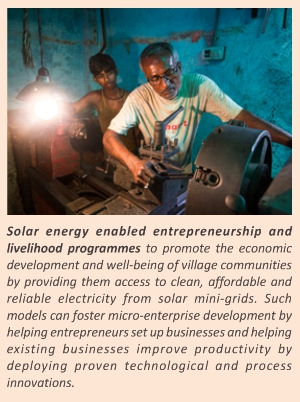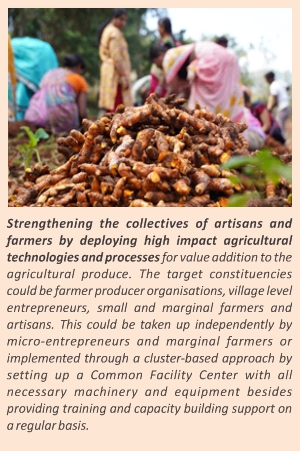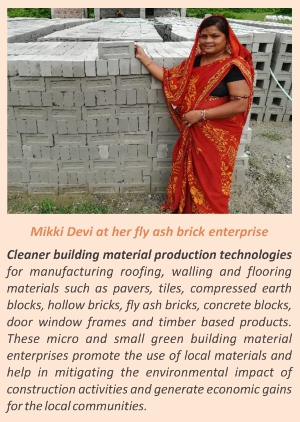Technology-driven Sustainable
Livelihoods for a Self-Reliant India
Today
in the current COVID-19 pandemic, there is an urgent need for vil lages
and small towns to become increasingly “Atma Nirbhar” (self-reliant) with
reduced dependence on externally sourced products and services. Such a
transformation can be enabled through enhanced levels of entrepreneurship in
which science and technology plays a crucial role to establish distributed
‘epicentres’ of local value creation that become engines for the creation of
vibrant, equitable and environmentally sound local economies. This can be
done by combining emerging demands in rural markets, with new products and
technologies and incorporating skills which migrants bring back to villages
- by truly making “local” more “vocal”.
lages
and small towns to become increasingly “Atma Nirbhar” (self-reliant) with
reduced dependence on externally sourced products and services. Such a
transformation can be enabled through enhanced levels of entrepreneurship in
which science and technology plays a crucial role to establish distributed
‘epicentres’ of local value creation that become engines for the creation of
vibrant, equitable and environmentally sound local economies. This can be
done by combining emerging demands in rural markets, with new products and
technologies and incorporating skills which migrants bring back to villages
- by truly making “local” more “vocal”.
Enabling Ecosystem for Scaling Technology-driven Livelihood Models
Technologies and micro enterprise models and their enthusiastic and widespread uptake by agencies in different parts of the country and abroad, indicate the efficacy of the endeavours and methodologies underpinning them. However, the mere development and demonstration of technologies will not be enough. Micro enterprises, as a network, must collectively show impact at a national scale. There is a need for improved synergy and cooperation among actors in India’s entrepreneurship ecosystem.
As such a network is built, a concerted effort
is also required to overcome the challenges faced by aspiring entrepreneurs
who wish to set up businesses and those who aim to make their enterprises
grow. Often, this starts from assistance in deciding which business to set
up, particularly in light of the changing aspirations of people, market
dynamics and resource base. Many micro enterprises find it difficult to
adapt to an evolving digital paradigm and incorporate technology advancement
in their processes. Furthermore, these enterprises face challenges regarding
availability of support services in the areas of technology, finance, market
linkages and capacity building that limit their gr owth
and sustainability. This issue could be resolved by creating an enabling
enterprise ecosystem with a network of agencies who can deliver the required
support services from various actors in the ecosystem.
owth
and sustainability. This issue could be resolved by creating an enabling
enterprise ecosystem with a network of agencies who can deliver the required
support services from various actors in the ecosystem.
In order to create this enabling ecosystem and effect change at scale in rural India, there are certain policy changes that would be required keeping the interest of the micro entrepreneurs, migrant workers, artisans and farmers at the centre. The inclusion and formalisation of these constituencies would enable targeted delivery of benefits by creating the required infrastructure, credit channels, skills & resource mapping and training & capacity building measures among others. For effective implementation, Regional Enterprise Coalitions could be formed where regional and district level public and private agencies come together to promote enterprise development. Such a participatory platform will also provide the desired “bottom-up” feedback to formulate policies based on assessment of on-ground needs.
Such systemic solutions will be required to establish multiple channels for access to technology and know-how, as well as business skills. This will require the creation of new platforms to strengthen the local enterprise incubation ecosystem and integrate new economy solutions with traditional skills. The potential impact of investing in an ecosystem to promote widespread eco-inclusive entrepreneurship can be quite significant. It is possible to set up over 2 million enterprises and create approximately 10 million jobs across 700,000 villages and small towns of India. These enterprises will at an average of Rs. 5,00,000 per annum, create value within the local economy of over INR 1,00,000 crores each year, thereby producing much needed goods and services and establishing robust village economies.
Achieving Self-Reliance through Green Business Centres
Green Building Centres (GBCs) are one possible
form of self-sustaining commercial units which can provide building material
products and services for high quality construction of houses and rural
infra structure. The GBCs can create employment, develop skills of the
workforce engaged in the construction sector and assist in transforming
village clusters into production and service delivery hubs for not only
building materials but allied goods as well.
structure. The GBCs can create employment, develop skills of the
workforce engaged in the construction sector and assist in transforming
village clusters into production and service delivery hubs for not only
building materials but allied goods as well.
Set up by the state governments in partnership with private industry, particularly cement companies and other business associations, such centres can combine the direct provision of concrete jobs and livelihood opportunities for local people, with interventions to build long term sustainability through cleaner technologies, skill development, grassroots entrepreneurship and market development. These measures go beyond mere emergency response and prioritise long term measures which build local capacities for economic, social and environmental resilience.
With rapidly growing complex social and environmental challenges, the large-scale use of technology-based social enterprises will become imperative to address the needs of rural India. Mikki Devi had set up Bhawani Shankar Fly Ash Bricks with an initial investment of INR 4.5 million, of which INR 2.35 million was sourced through the PMEGP credit linked scheme. Her unit before the pandemic provided employment to 16 individuals, of which eight were permanent skilled employees and remaining were hired seasonally. Such enterprises not only hold the potential to meet the demand for construction materials in the country but also to absorb the returning skilled migrant workers to rural areas.
There is an urgent need to go beyond mere emergency response measures and prioritise long term measures which build local capacities for economic resilience, while ensuring social and environmental protection of all. The pandemic is a reminder to respond to these intensifying needs to reimagine a future that all Indians identify with and truly ‘own’. ■
Sudhir Sah and Saubhagya
Raizada
ssah@devalt.org and sraizada@devalt.org